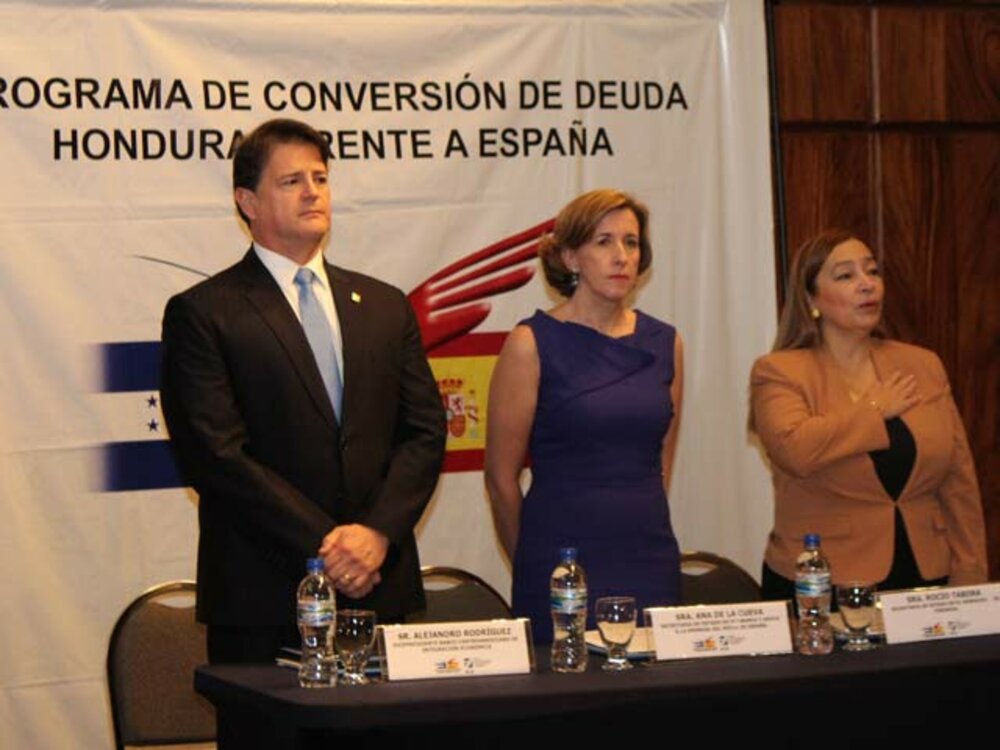Honduras, Spain and CABEI work towards the sustainable development of the Honduran people

The initiative emerged in 2005 from a shared effort between Spain and Honduras.
With the execution of Spain's Debt Conversion Program to Honduras, 23 development projects have been implemented in the strategic areas of education, renewable energy and the environment.
Tegucigalpa, February 4, 2019.- Today, Spain's Debt Conversion Program to Honduras (PCD 2005), which is administered by the Central American Bank for Economic Integration (CABEI), formalized its closure. It should be noted that the Program began its activities in 2006 and ended in December 2018. This important alliance allowed that the proposed objectives, results obtained and the fulfillment of the goals of 23 development projects be met with quality and efficiency.
The closing ceremony of the Honduras Spain Fund Program Phase I had the participation of Spain's Secretary of State for Economic and Business Affairs, Ana de la Cueva; Honduran Finance Minister, Rocío Tabora; and CABEI Executive Vice President, Attorney Alejandro Rodríguez Zamora.
An initiative that promotes Honduran growth
As established in the Program document, the Government of Spain proceeded to cancel the debt contracted by Honduras for a total of one hundred and thirty-eight million three hundred thousand dollars (US$138.3 million).
For its part, the Government of Honduras created the Honduras-Spain Fund to which it transferred the amount of fifty-five million three hundred thousand dollars (US$55.3 million) for the financing of bi-nationally agreed upon projects that promoted the development and poverty reduction of the Honduran territory.
In support of State Secretaries, decentralized organizations, local governments/municipalities-municipal associations and foundations, the PCD managed to implement 23 development projects in vulnerable and low-income communities, directly benefiting approximately 1.3 million inhabitants in 13 of the 18 departments of Honduras and in 34 municipalities nationwide.
These initiatives were implemented in the three strategic axes of the program: 12 in the education axis, 10 in the environment axis and 1 in the energy axis. Subsequent to the intervention of the PCD, the communities and their inhabitants could have access to potable water systems, landfills, ecotourism works, construction of educational centers and equipment for pre-basic, basic, higher and university levels, as well as laboratories and workshops for different specialties, including wood energy, energy, biogenetics, robotics, hydraulics, soils, geographic information, carpentry and IT, among others.
The actions executed through this Program fall under the framework of the development policies of the Governments of Honduras and Spain, as well as the axis of Social Development of CABEI's 2015-2019 Institutional Strategy, which is aimed at improving the quality of life of the Central Americans.
Participants at the event included representatives of the Governments of Honduras and Spain, CABEI authorities, the consular corps, representatives of different funding sources, beneficiary entities and project executing contractors. The Program's noteworthy achievements and the efficient management of the Honduras-Spain Fund by CABEI were presented at the event.







